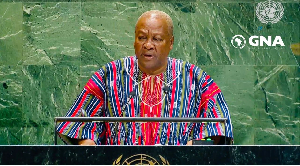Let’s Do the Noble Thing: Expunge the Indemnity Clause
One extremely divisive subject discussed on the web is the Indemnity Clause of the 1992 Constitution. The Government’s recent creation of the Constitutional Commission to revisit the Clause is reassuring. It
reflects leadership that is sensitive to the sentiments of those led, exhibiting the moral will to act proactively by addressing some of our myriad pressing national issues. While it may be premature to pass comments before the completion of the review and analyzing the plausibility of the reasons given therefor, it is appropriate to be optimistic, pending the outcome when the record would tell whether a full credit or no credit is due the initiative.
This article has drawn much of its vitality from many past articles on the validity of the Indemnity Clause. While some of the arguments presented for the Clause are not totally meritless, the counter-arguments seem so compelling that, unless the constitutional committee comes with countervailing findings and recommendations, this author, with all due respect, submits that the only noble course to take is to get rid of the Indemnity Clause.
Morally, one argument presented in support of the Indemnity Clause is that it would promote stability in our system. However, this argument ignores the fact that so long as the Clause exists, the on-going
destabilizing criticisms would continue, especially given some of the questionable underpinnings of its issuance (its having been allegedly sneaked into the Constitution), and the fact that there has never been
any authoritative pronouncement on the Clause’s validity.
Another argument often advanced for the Indemnity Clause is that it was inserted to foster the transfer to civilian rule. The argument urges that, without the Clause, the transfer to civilian rule would have been
infeasible. Again, this argument is logically bankrupt. As with the PNDC coup that led to the insertion of the Clause, the leaders of all the coups had always promised to turn over the government to civilian
rule. It is thus incongruous, extremely self-serving, and self-contradictory to say that the PNDC, which seized power promising to shortly hand over to civilians, would turn around after wielding power for nearly twenty years to precondition handling over to a shield by an indemnity clause. Clearly, this effort to treat the Indemnity Clause and handing over as though the two are mutually inclusive is ludicrous.
A third argument advanced to support the Indemnity Clause is that its retention would enable the country to forget the past and move forward and face its developmental challenges squarely. That the government needs an absolutely full focus to tackle the herculean challenges facing us is a fact beyond question. But the retention of the highly controversial Indemnity Clause is certainly not a panacea to the
challenge. With all the daily distractions wrought by the Indemnity Clause and the unspeakable tribal and ethnic animosity engendered thereby, it should be clear that focusing and tackling our challenges
squarely would be more readily attainable with the Indemnity Clause expunged than otherwise.
Fourthly, the supporters of the Indemnity Clause contend that its expungement would trigger a personal vendetta and witch hunting of past offenders. Here too, the argument ignores the fact that an expungement can be made with a reconciliatory spirit and goal to redress the wrongs visited upon the victims by, among other things, compensation and apology, without punishing any past military leader.
At this point in our history when it has been clear to all that coming into power by extraconstitutional means destabilizes every facet of our system, one prudent thing is to obviate any and all conceivable
incentives for extraconstitutional pursuits. With the Indemnity Clause s ' continuing entrenchment in our system reflecting our cowardice stance, the chances of the unthinkable happening are not
far-fetched. A group of people may misguidedly think that they can overthrow a constitutional regime and shield themselves with an indemnity clause. Conversely, expungement of the Indemnity Clause would be a great disincentive for such thinking. Let's take the noble step: expunge the Indemnity Clause.
On the con side, expungement of the Clause is consistent with our morals and the need to develop our system in keeping with our Freedom and Justice ideal. As human beings, none of us is perfect. We are
taught that when we err, we must acknowledge our mistakes and correct them. This is a bedrock teaching on discipline, decency, civility, and humility. The Indemnity Clause, in precluding review, revision, expungement, etc., even where it is patently wrong, defies these bedrock teachings, and reflects arrogance, indiscipline and a perpetration of double standards. This, without doubt, compromises
stability and our venerable Freedom and Justice dogma, by fostering the insinuations and attacks frequently calling on the government to eradicate the Clause.
Further, it is well known that leadership runs with accountability. One cannot be a leader, especially in this case toppling a leader constitutionally chosen, claiming that that toppled leader was inept, corrupt, etc., and yet foreclosing all avenues to evaluate the toppler.
Without referencing the time-honored notion that the guilt runs when not being chased, it is obvious that the past military leaders would be better of without the Indemnity Clause. Take former President
Rawlings, for instance. Day in and day out, people attack him on the media in ways that many people would decry. He is conclusorily accused of being corrupt, a murderer, a dictator, you name it. He, in turn, defends himself intensely, pointing at those who rather deserve the attacks. It is possible that some of these attacks are unfounded. But until and unless there is an opportunity to look into them objectively
by a neutral body, such as the courts or a properly constituted tribunal, minds would continue to be polluted about Rawlings, heightening the divisiveness wrought by the Indemnity Clause. Conversely, if the Clause is vacated and avenues are created for the government and or the courts to investigate or adjudicate these conclusory allegations, the names of our past military leaders may be
cleaned forever, if it is found that they were, indeed, clean during their regimes. A good example here is the case of some former leaders who were intensely criticized for misappropriation of articulators,
etc., in the late 1960s and early 1970s. As you may recall, those insults and criticisms died out when the ensuing commission of inquiry concluded that the allegations were unsupported.
It would be fairer to Rawlings and our other military leaders if there is an objective opportunity to review what they did than it would be without that opportunity. The expungement of the Indemnity Clause is
the noble way to do that.
The pluses on the legal side are equally limitless. First, the Indemnity Clause, in prohibiting any review, revision, and correction of anything done by any of our past military governments, trumps our sovereignty. As sovereign, the Ghana Government should have the power to do anything– change its laws, abrogate them, correct errors, and scrutinize its officials without fear or favor. Here, the Indemnity Clause forecloses these incidents of our sovereignty. This is wrong, and it must be corrected.
Second, the Indemnity Clause violates the principle that a government
should not bind its successors in perpetuity. Thus, it is irrational and must be corrected.
Third, the Clause obliterates the separation of powers principle. The Constitution poignantly provides that neither parliament, the executive, nor the judiciary should control the other, and that all three should be pari pasu. This bolsters our system of government, fostering the independence and impartiality of the judiciary. The Clause’s prohibition of the judiciary from reviewing any act done by any military regime is a huge affront to the independence and impartiality of the judiciary because it effectively precludes the judiciary from dispensing justice and redressing any wrongs committed by any of our military regimes. In the more mature legal systems, the judiciary’s independence is beyond reproach. The lessons taught by Marbury v. Madison that "it is the province of the judiciary to say what the law is" is vitiated, by the Indemnity Clause. This is another reason why the IC must be got rid of.
In countries where the independence of the judiciary means what it states, neither the executive nor the legislature can curb the independence of the judiciary, no matter how much vote they could cull
and how much power they wield. In the United States, for instance, a case called Sherbert v. Verner established some norms regarding some deeply embedded constitutional rights. Over time, the U.S. Supreme Court, in a case called Employment Division v. Smith reversed these norms. Congress, comprising both the U.S. House of Representatives and the Senate, along with the U.S. President’s signature, passed the Religious Freedom Restoration Act, to invalidate the Smith decision. With no hesitation, the U.S. Supreme Court, in keeping with its constitutional duties, interpreting the law and saying what it is (Marbury v. Madison), courageously invalidated the Religious Freedom Restoration
Act on the basis that it was unconstitutional. City of Boerne v. Flores. In our drive to improve our legal and judicial system, we need to give the independence of the judiciary it’s true meaning by honoring our stewardship and respecting the separation of powers principle: we should not keep it as a mere window dressing. In retired Supreme Court Justice A. P. Kludze’s recent remark on some of the things compromising the integrity of our judiciary, he hammered indirectly on the separation of powers principle. What kind of government do we want? Do we want one that respects our rights and protects them without fear or favor like the U. S. system tries to do? Or, do we prefer playing the ostrich, chanting freedom and justice while allowing an Indemnity Clause to trample on our rights? I will opt for the former. But that option can be realized only if we eschew the hypocrisy and obviate the Clause, which makes our Constitution self-contradictory, granting by one hand all the lofty and virtuous protections afforded in progressive constitutions while at the same time vitiating those very rights by the other hand via its purportedly untouchable the indemnity Clause.
Finally, granting immunity to past state officials who assumed power forcibly on a mission to eradicate corruption and correct societal wrongs defy all logic. In political circles, specifically the running of governments, immunity is afforded to government officials for the negligence they commit while in office. The rationale for this special dispensation is to enable them do their work freely and progressively without worrying about lawsuits for their innocent wrongful acts. This immunity does not apply for their intentional acts.
The 1992 Constitution’s Indemnity Clause is incongruous with the rationale upon which government officials are afforded immunity because it is post hoc, utterly bereft of the progressive reasons normally supporting immunity, viz., encouraging current government officials to work freely without fear. The Indemnity Clause does not have this positive element because the officials that are covered are no longer working for the government. In addition, even where public officials are immune for acts commuted while working, the immunity does not extend to intentional acts. The indemnity Clause fails this test too. Accordingly, because it is devoid of anything to support it, whether morally or legally, we should be sincere and do the decent and honorable thing: remove it from our Constitution. May God Bless Our Homeland, Ghana.
By Nii Otu Quaye
Opinions of Monday, 4 October 2010
Columnist: Quaye, Nii Otu














